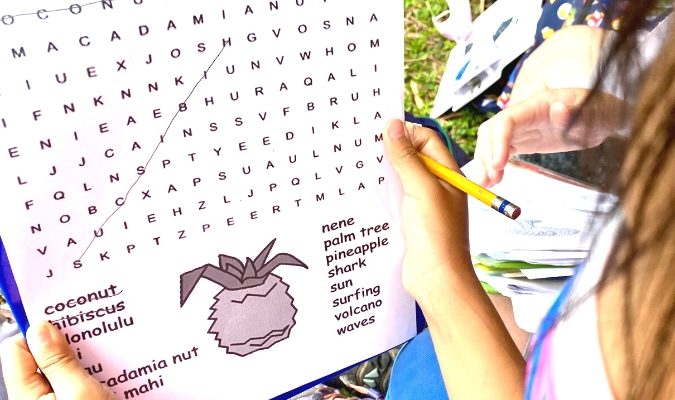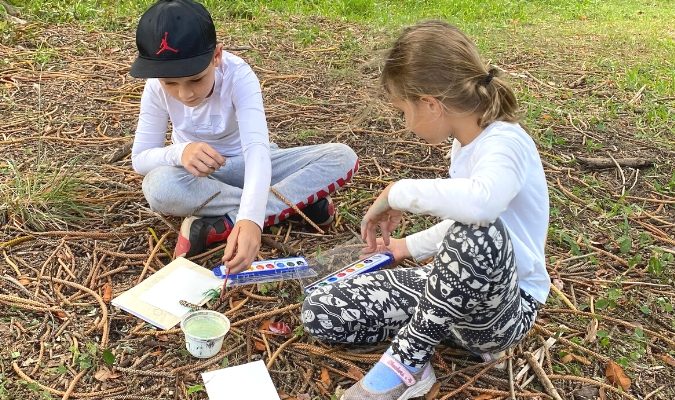O‘ahu Environmental Science Series
O‘ahu Homeschool Science Series
2131 Makiki Heights Drive, HNL | 808.955.0100 x126 | Homeschool@HawaiiNatureCenter.og
Hawai‘i Nature Center offers an on-campus science series in which every class builds upon each experiential lesson. Created to bring together homeschool students, ages 6 to 11, the weekly 6-hour sessions on Wednesdays are live, in-person and teacher-led. It includes learning in the Makiki rainforest as well as field trips. Topics include: animal lifecycles, freshwater ecosystems, food webs, sound, electricity, colors in nature, invasive species, volcanism and more.
Download the Spring 2025 Course Outline
Fall 2025 Course Outline coming soon!
Fall 2025 O‘ahu Homeschool Science Series | For Ages 6 to 11
Registration opens June 16th!
September 3 – December 10, 2025 | Weekly on Wednesdays from 8:30 am (drop-off as early as 8:15 am) to 2:30 pm
Full Semester: $1,200 + fees (all 14 weekly classes) | Individual weekly classes are not available for purchase
No classes will be held on October 8 due to Fall Nature Adventure Camp.
Science, Sustainability, and Solutions: Exploration form Makiki Valley Across Oceania
Join the Science Series Hawai‘i Nature Center Homeschool program for the 2025 Fall semester cohort as we dive into learning and exploring our way from Hawai‘i to Oceania. We will weave through time and space to learn about the natural world, sustainability, and the modern issues facing these communities, all with a hope-filled, hands-on, and screen-free approach. Below is our outline of this 3-unit program where we’ll incorporate scientific method, data collection, and field trips into each unit with group projects, hiking, games, crafts, exploration time, and more!
Field trips do not include swimming in the water and will require families to meet at the field trip location due to limited access and funding for buses. Further information will be shared with families during and prior to the semester, including during the beginning of semester informational session, Week 1 of the program.
Registration opens June 16th!
If sold out, please contact Homeschool@HawaiiNatureCenter.org to be wait-listed for the series. Include the number of children you wish to enroll, their ages, and your best contact phone number.
Fall 2025 Lessons Overview
September 3 – Decmeber 10, 2025. No classes will be held October 8 due to Nature Adventure Camp.
Fall 2024 O‘ahu Homeschool Science Series | For Ages 6 to 11
This semester is sold out.
September 4 – December 11, 2024 | Weekly on Wednesdays from 8:30 am (drop-off as early as 8:15 am) to 2:30 pm
Full Semester: $1,200 (all 14 weekly classes) | Individual weekly classes are not available for purchase
No class will be held on October 9 due to Fall Nature Adventure Camp.
If sold out, please contact Homeschool@HawaiiNatureCenter.org to be wait-listed for the series. Include the number of children you wish to enroll, their ages, and your best contact phone number.
This semester is sold out.
Fall 2024 Lessons Overview
September 4 – December 11, 2024. No classes will be held on October 9 due to Nature Adventure Camp.
Gear Up & Get Ready
- Eat a hearty breakfast.
- Wear clothes and closed-toe (hiking or athletic) shoes that can get wet and dirty.
- Put on mosquito repellent and sunscreen at home.
- Leave anything expensive, valuable, or fragile at home.
What to Pack Daily
- Small backpack
- Water bottle
- Morning snacks and a big lunch (no refrigeration)
- Extra change of clothes, raincoat/poncho and water shoes
- Sunscreen, hat, and sunglasses
- Swimsuit and towel
- COVID facemasks (optional)
REFUND & CANCELLATION POLICY – SEMESTER If enrollment is canceled 7 days or more prior to the program’s start, you will receive a refund less a $100 cancellation fee per child and associated administrative-processing fees. If enrollment is canceled within 7 days of the program’s start or up to 6 weeks after the program has begun, Hawai`i Nature Center will refund 50% of the program fee per child. HNC memberships purchased during enrollment will not be refunded. There are no refunds after the end of the sixth week of the program. No refunds or makeups for individual classes missed.
THIRD-PARTY REGISTRATION POLICY Hawai`i Nature Center does not accept third-party registration or registration on behalf of other friends or family. The registering child’s parent or guardian must be the individual to complete and submit all registration information. If we determine that a third party has completed your child’s registration, registration will be cancelled and we will refund your tuition. A $50 cancellation fee per child per week and administrative-processing fees will be charged.


